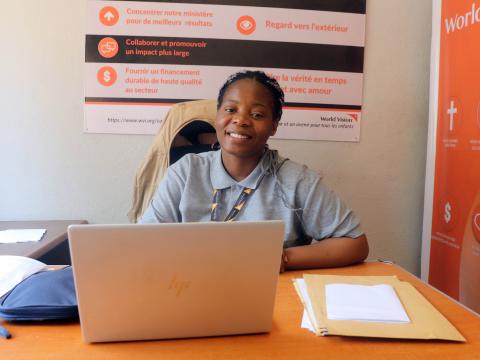DR Congo: Let's encourage and promote breastfeeding for professional women within World Vision and within communities.

By Tatiana Ballay - Communications Officer/ World Vision DRC & Dr Philippe Ngenda - Health & Nutrition Advisor
On the occasion of World Breastfeeding Week (WBW), whose theme for 2023 is "Enabling breastfeeding: making a difference for working parents", World Vision DRC is calling for breastfeeding to be encouraged and promoted for working mothers, also in communities where nutrition programmes are being implemented.
"Breastfeeding gives every child the best possible start in life. It brings health, nutritional and emotional benefits to children and mothers alike. And it is an integral part of a sustainable food system", recalled Manuella, a young mother of a 6-month-old baby and Bookeeper with World Vision DRC, during an interview in the run-up to World Breastfeeding Week.
Manuella is 26 years old, married and the recent mother of a baby girl. When Manuella had her first child, she put into practice what her mother and several colleagues working in health and nutrition programmes had taught her many times during her pregnancy. In the course of her work, she regularly rubs shoulders with colleagues in various community programmes, including health.
She has already had the opportunity to attend a training session for trainers on the DPH (Positive Deviance Hearth) approach used by the Kapolowe nutrition project to promote breastfeeding. Her midwife has already advised her on the importance of early and exclusive breastfeeding for the first six months, and of continuing breastfeeding for two years and beyond.
"Here at World Vision, we have nutrition programmes that address this issue. The recommendations and advice I received from my doctor and my midwife, Mrs Dorcas, taught me that breastfeeding gives every child the best possible start in life. It brings health, nutritional and emotional benefits to children and mothers alike. And it is an integral part of a sustainable food system", says Manuella.
Dr Adamo is a health and nutrition specialist in the Maisha programme area, in the town of Mutshatsha. Dr Adamo and his team in charge of the Nutrition project in Mutshatsha stressed that "breastfeeding is a natural process, but it is not always guaranteed". They pointed out that mothers need support both to start breastfeeding and to continue.
Advice on breastfeeding can help mothers gain confidence while respecting their individual circumstances and choices. It can help women overcome difficulties and prevent feeding and care practices that can be detrimental to optimal breastfeeding, such as offering infants and young children unnecessary liquids, foods and breast-milk substitutes.
"It is possible to prolong breastfeeding by improving access to qualified advice and to promote exclusive breastfeeding, which has benefits for babies, families and economies," says Dr Adamo.
According to article 130 of the DRC Labour Code, "Every woman has the right to suspend work for fourteen consecutive weeks, including a maximum of eight weeks after delivery and six weeks before childbirth". Article 132 addresses the issue of breastfeeding: "When a woman is breastfeeding her child, she is entitled, in all cases, to two half-hour rest periods per day to enable her to nurse her baby.
However, maternity leave at World Vision is currently 14 weeks, half the recommended duration for exclusive breastfeeding.
To make up for the seemingly short maternity leave for working breastfeeding mothers, some have come up with fairly simple solutions that can help them stay close to their babies and breastfeed them even though they are at work.
"I think it's necessary to strengthen support for breastfeeding in the workplace, given that exclusive breastfeeding is instilled in breastfeeding women as good practice to prevent illness and support healthy child growth. In the workplace, it would be a good idea to provide a suitable place for a woman who lives far from her workplace where she could keep her baby with a nanny to look after her during working hours. She could then breastfeed her baby during the break, which would save time for the worker and for the company",says Kasongo Dina Lenge, Child Wellbeing Tracking Officer at World Vision DRC.
“In my previous job, I had the advantage of working in an office by myself. I occasionally brought my baby to the office when I couldn't get home at midday to breastfeed. If all women could be in the same conditions, they would work more serenely without stress", recalls Francine Lukusa, Advocacy Manager at World Vision DRC.
World Vision DRC works closely with the Congolese government and its technical structures, as well as with communities, to integrate, finance and implement essential nutrition actions through the health system. A key element of this approach is investing in and supporting the implementation of health and nutrition projects that implement the TTC=COC (Targeted and Timely Counselling) and DPF (Positive Deviance Focus) approaches, which prioritise breastfeeding and help strengthen health systems to make breastfeeding possible for working mothers.
In the Democratic Republic of Congo (DRC), according to the MICS-Palu 2018 survey, only five out of ten infants under the age of six months, i.e. 54%, are exclusively breastfed. Between the ages of 4 and 5 months, 70% of children are not breastfed, according to MICS-Palu 2018, which contributes to malnutrition, other illnesses and even child deaths.
Looking at the data nationwide, exclusive breastfeeding rates are impressive for the first three months, but it's from the fourth month onwards that we see a decline. One of the factors contributing to this situation is the challenge of getting women back to work, as they have the dual responsibility of earning a living while ensuring that they continue to breastfeed their babies exclusively. Given the need to improve conditions for breastfeeding working women, World Vision DRC remains a strong advocate for policy changes that will institutionalise an environment conducive to breastfeeding.